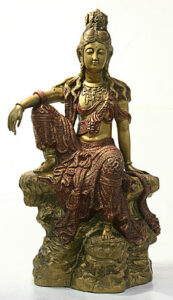Treating Alcohol Craving: Single Acupoint Kidney 9
Kristen Sparrow • September 30, 2014


Goddess of Compassion
“She who hears the cries of the world”
I would like to think one could treat alcohol cravings so easily, just a single bilateral point twice a week for two weeks. But alcohol cravings seem so multifactorial, it’s a bit hard to believe.
Effect of Zhubin (KI9) acupuncture in reducing alcohol craving in patients with alcohol dependence: A randomized placebo-controlled trial.
- 1Department of Psychiatry, Pusan National University Yangsan Hospital, Yangsan, Gyeongnam, 626-770, South Korea.
Abstract
OBJECTIVE:
To examine the effect of acupuncture on Zhubin (KI9) in reducing alcohol craving in alcohol-dependent patients.
METHODS:
Twenty male alcohol-dependent patients were randomly assigned to two groups, a treatment group (10 cases, age 43.0±6.8 years) and a placebo group (10 cases, age 44.5±7.9 years). The treatment group was treated with real needle acupuncture on Zhubin (KI9) twice a week for 4 weeks, and the control group was treated with placebo needle acupuncture. Both groups were given acupuncture treatment using Park Sham Device (PSD). Alcohol craving was measured by the Visual Analogue Scale (VAS) before treatment to establish a baseline, and after 1, 2, and 4 weeks of treatment. Repeated measures ANOVA was used to determine the main and interaction effects of time and on the outcome measure (VAS).
RESULTS:
There was a significant effect of time on VAS score (df=3, F=13.3, P<0.01). Main effect of group on VAS score was significant (df=1, F=10.9, P<0.01) and the time×group interaction was also significant (df=3, F=4.7, P<0.01).
CONCLUSIONS:
Real-needle acupuncture therapy on Zhubin (KI9) showed effectiveness in reducing alcohol craving. These results strongly suggest the usefulness of acupuncture therapy on Zhubin (KI9) in preventing a relapse in alcohol dependent patients.
- PMID:
- 25253549
- [PubMed – as supplied by publisher]

